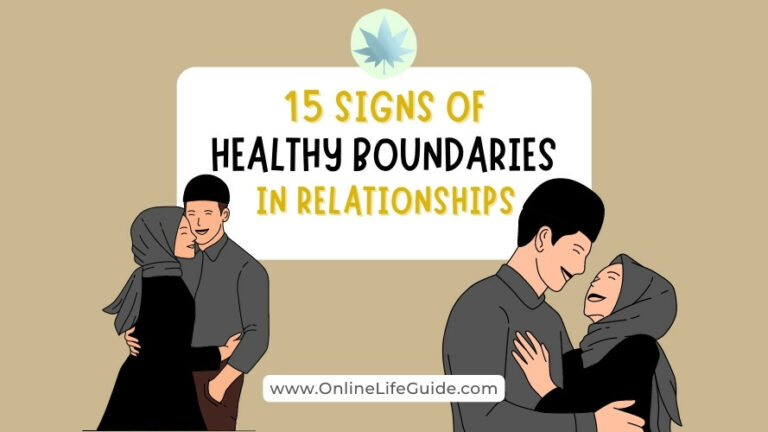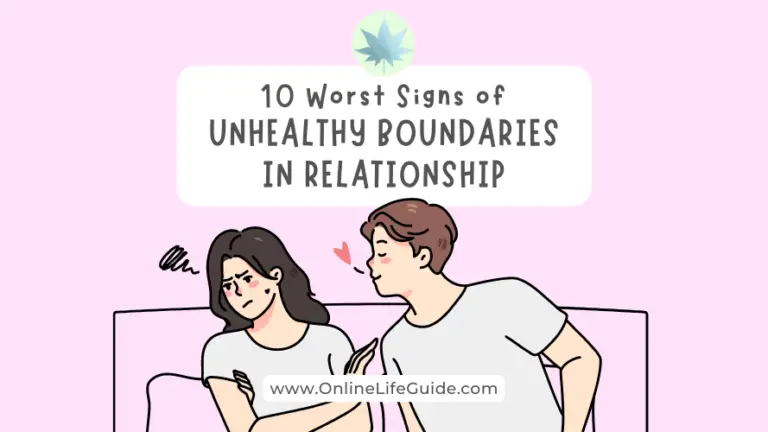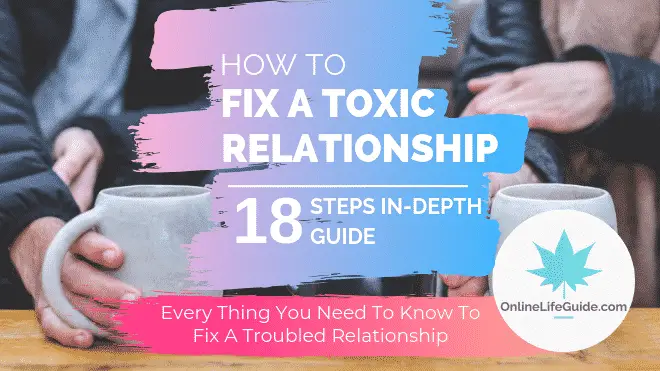A Complete Guide to Set Healthy Boundaries in a Relationship
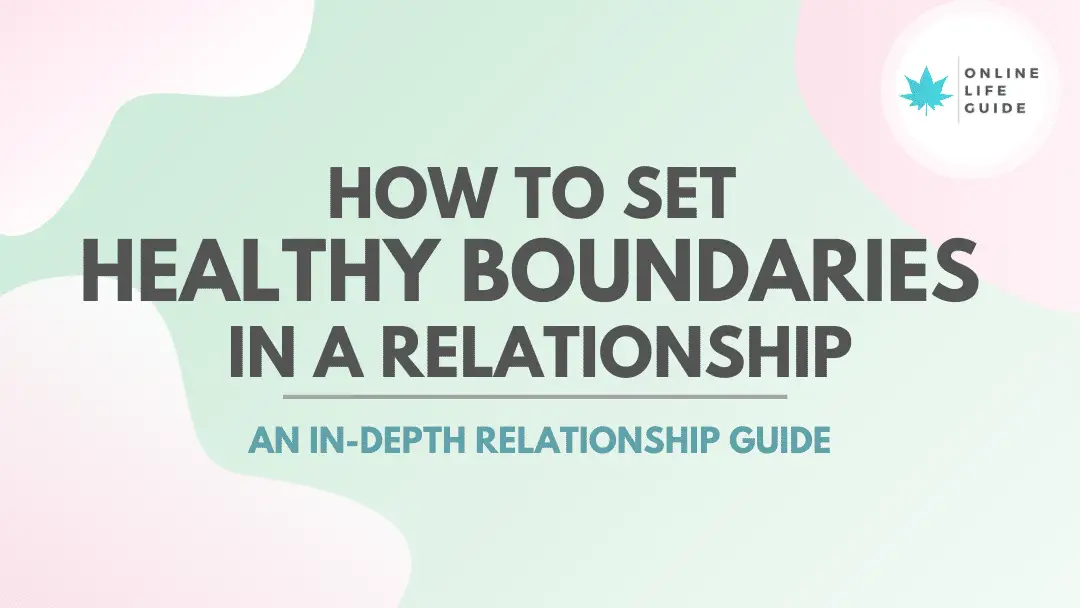
One of the top characteristics of healthy relationships is the ability of both people to consciously set and maintain healthy boundaries (that includes respecting the other person’s boundaries as well).
But why is it so important to set boundaries in romantic relationships?
Aren’t intimate relationships supposed to be, well, intimate? Wouldn’t it make the relationship too mechanical and limited?
This thinking pattern of “going with the emotional flow” is EXACTLY why it is so important to start setting some healthy boundaries.
We tend to get carried away by our momentary emotions, and as we all know by experience that our emotions tend to fluctuate A LOT. If our relationships depend solely upon how we feel, then get ready for the crazy roller coaster ride up ahead (or you might be on one right now).
Some foundational rules and strong, consistent boundaries provide stability and grounding for your relationship with your better half, so no matter what happens between you two, there will always be a threshold, a healthy limit that none of you must ever cross.
This is essential in maintaining respect in life-long relationships.
Setting boundaries in marriage is a very delicate and deliberate process. Too much distance and you’ll have problems, too much closeness and you’ll face problems as well.
Having healthy boundaries with your spouse is about developing a fine balance between distance and closeness.
How can you set these healthy boundaries in your relationship? Well, that’s what this in-depth relationship guide is all about. Sit tight and read on!
Why is it so Important to set Healthy Boundaries in Relationships?

Boundaries define what is appropriate in the relationship and what is not. They define the limits and the space of each individual. Boundaries also tell us what behavior/action is appropriate in a particular context.
Context is important. When it comes to boundaries, it’s not always about what is morally right or wrong, but what is appropriate in a particular context for a particular individual.
Someone might argue that “I didn’t do anything wrong” or “I was just trying to help”, and they would be true, there might not be anything morally wrong with their behavior, but it might not be appropriate in that specific context with that specific person.
Often people complain about losing respect in the relationship, the major reason for that is the lack of healthy boundaries or not being able to maintain them consistently.
Poor boundaries often lead to feelings of frustration, helplessness, anger, and resentment in a relationship. It’s a one-way ticket to emotional burnout.
Loose and undefined boundaries are also often the reason for clinginess and neediness in intimate relationships. When people in a relationship either don’t take responsibility for themselves or consider themselves overly responsible for their partner’s actions and emotions, that is when boundaries are usually crossed.
Here are a few reasons why every single one of us must begin to prioritize setting boundaries in our relationships and how they can dramatically impact the quality of our lives.
Maintaining Your Own Sense of Identity

After many years of marriage, one of the things many people face (but don’t realize) is losing their own individuality and their own independent sense of identity.
We unconsciously begin to associate our sense of identity with our relationship and our partner. There is nothing bad about associating part of your identity with the love of your life. That’s natural and okay.
What’s problematic is losing your own SELF in the process.
When your happiness and well-being solely depend upon your relationship,
when you think your partner is solely responsible for bringing you joy and happiness,
or that you are solely responsible for your partner’s happiness,
When you don’t have any independent hobbies, self-care activities, and interests, or have your own friend circle,
When you think your partner must not do anything without you,
And you find it hard to love yourself as an individual,
then it’s a clear sign that you have not been maintaining or respecting boundaries and that there is a major boundary issue in your relationship that you need to start working on immediately.
Maintaining Respect and Trust in the Relationship

The ability to set and maintain boundaries depends a great deal on the level of trust in a relationship. This may sound a bit strange but believe me, it’s not.
Many people with boundary issues would say “But we trust each other. Trust has never been a problem”.
Well, that might apparently be true that there is generally a level of trust when it comes to certain things and matters, but what most of us don’t realize is that when there is a boundary issue, on a subconscious level, there might be some lack of trust regarding that particular thing.
Let me explain.
See, to respect your partner’s boundaries, you’ve got to trust them. If your partner doesn’t like it when you use their phone or computer without their permission, you’ve got to trust their privacy.
If your partner wants to go hang out with their friends without you, you’ve got to have trust in them.
When your partner wants some time alone, you’ve got to trust that your partner just needs some time to recharge and reconnect and that there’s nothing wrong with them or your relationship.
On the other hand, when you want some me-time or want to go hang out with your friends, you’ve got to have trust that your partner can take care of him/herself without you and that you don’t have to be with them all the time.
The list can go on, the point being that trust and boundaries are directly or indirectly interconnected. When you set boundaries, it requires you to have trust to be able to maintain them consistently.
It kind of forces you both to increase your level of trust in the relationship and not try to control every single thing.
Knowing the Limits

Clear boundaries help identify the limits that must never be crossed. This is REALLY important for the health of any relationship. There are things that must never be said and acts that must never be done because once it’s done, it changes things.
It’s a major blow to the respect and trust in the relationship once the “limits” are crossed.
It’s crucial that the couple should sit and communicate this through, and have a pact, a promise to each other that no matter what, they will not cross these lines under any circumstances.
Establishing a Sense of Stability and Security in Your Relationship

If you don’t have any definitive boundaries, how will you differentiate between the little rights and wrongs in your everyday life as a couple?
The entire dynamic of your relationship will be dependent upon the moods and whims of both people, and that is not a very stable foundation to base a life-long relationship.
People who lack boundaries in their relationship often feel like walking on eggshells when it comes to dealing with their partner. There is this exhausting unpredictability that ruins the sense of comfort and security that we all seek in our love life.
In other words, such a relationship is highly unstable.
On the other hand, well-defined and well-communicated boundaries create a sense of clarity and certainty between the couple which also contributes greatly to developing a deeper understanding of each other.
(Related: Powerful Affirmations for Toxic Relationships)
How to Set Healthy Boundaries in Your Relationship

The foundation of setting most boundaries is simply the ability to say ‘NO’. You cannot set clear boundaries if you can’t stand by them and say No when they’re about to be crossed.
The people-pleaser within us often gets in the way of boundary setting. Whenever you’re afraid that your partner might not like it when you draw certain boundaries, just remind yourself that it’s for the better.
If you don’t set clear boundaries now, it might negatively affect your relationship in the long run and you might end up hurting your partner and your relationship a lot more.
I love the title of the book “Boundaries: Where You End and I Begin – How to Recognize and Set Healthy Boundaries” by Anne Katherine. The title alone explains the crux of boundary setting.
It’s a good read for those who are facing boundary problems in life, whether it be in romantic relationships or in general. You can get the book on Amazon by clicking the link below:
Lack of Boundaries Lead to Enmeshment

Oftentimes what people perceive as closeness and intimacy can actually be enmeshment.
Now, what in the world is “Enmeshment”? you might ask.
The term “enmeshment” was coined by Salvador Minuchin, who is a pioneer in structural family therapy, and it refers to the enmeshing of the identities of two people. Meaning the two people are so entangled and immersed in each other that their identities are merged and they no longer have their own unique, independent identities.
One of the critical things to understand when you are out to set some boundaries and wish to balance things out a bit in your intimate relationship is to understand the difference between enmeshment and intimacy.
A LOT of people get into trouble with their relationship because they’re not quite clear about what intimacy is and where to draw boundaries. Many people think that intimacy means having no privacy or space between two people. That is where the troubles start.
I have written separate guides on understanding Enmeshment in Romantic Relationships, and the Difference between Enmeshment and Intimacy.
The topic of enmeshment is very closely related to boundary setting. If you’ve had trouble setting boundaries, you might be facing enmeshment issues as well. Make sure to check out the guides mentioned, as understanding the psychology and traits of enmeshment can be a game changer for people struggling with boundaries (talking from personal experience).
Some main distinctions between enmeshment and intimacy as explained in the infographic below:
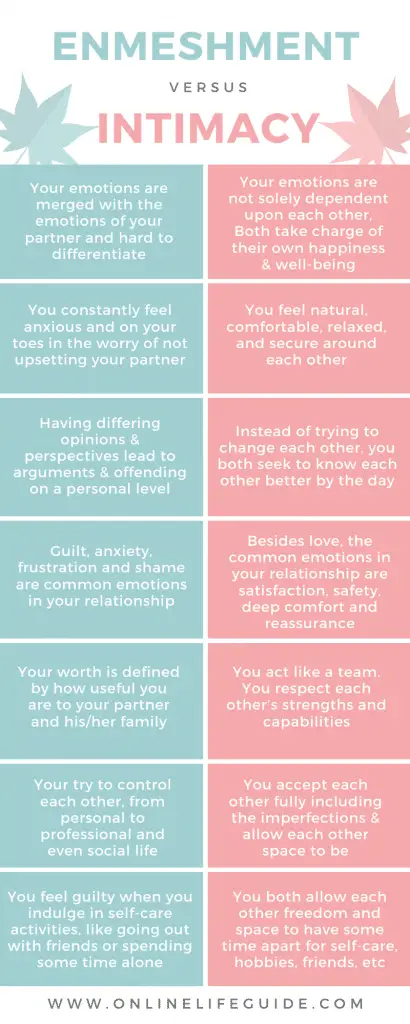
7 Steps to Setting Healthy Boundaries in Your Relationship
Setting boundaries, to be honest, is not rocket science at all, but it requires deliberate and consistent action. We’ll break it down into 7 actionable steps.
Remember that the key to being successful at setting good boundaries is respecting yourself, your time, and your personal space, while also showing respect toward your partner’s boundaries.
The second key is to muster up the courage to stand up for your boundaries where needed and maintain them along the way.
1. Know Your Boundaries

The very first step is to identify what exactly are your boundaries in certain areas of life.
Since most of us haven’t ever thought about it consciously, we are not even clear about our own boundaries. When someone crosses them, we feel uncomfortable but can’t really specify why we are feeling uncomfortable and what boundary the other person violated.
If we are not clear about our own boundaries how can we expect the other person to know and respect them?
Take a pen and paper and spend some time with yourself. Reflect on the instances where you felt your boundaries might have been crossed. Identify what boundaries were those.
Identify what is acceptable for you in certain areas and what is not acceptable.
2. Communicate Your Boundaries Clearly and Precisely

Once you have clearly defined your boundaries, choose a suitable time to sit and discuss them with your partner. Pick a time when they are free, relaxed, and somewhat open to listening.
Be polite, yet very clear in your selection of words. Avoid over-explaining, ranting, or rambling. Make it to the point and communicate your boundaries very precisely.
Don’t fill the conversation up with extra fluff or your message will not be communicated clearly and will get lost in all the extra talk. The clarity in conversation will allow your partner to absorb the specific message you’re trying to communicate and it will be easier for them to remember the purpose of this conversation.
Avoid argumentative, nagging, and complaining tones, as that might trigger defensiveness and serve as a distraction from the important message, i.e. your boundaries.
3. Communicate Why is it so Important to Set those Boundaries (and the Consequences of Not Maintaining Them)

As you communicate your boundaries with clarity, you must also communicate exactly why it is so important for your relationship to maintain them, and how violating those boundaries will negatively impact your relationship with your partner.
If it’s about a serious matter, you might want to set very clear consequences for violating certain boundaries. In fact, according to some therapists, it’s difficult to set boundaries if there is no definitive consequence for violating them.
Don’t go overboard when setting consequences. Set practical consequences that you could carry out whenever the boundaries are crossed, and which provide enough feedback and a clear message to the other person that they should stop messing with your boundaries.
The magnitude of the consequences should be in alignment with the magnitude of the boundary violation. If it’s a small boundary violation, let the consequence be mild. If it’s a major boundary violation, make sure the consequence you’ve set is enough to send a clear and firm message.
4. Repeat the 2nd & 3rd Step As Many Times as You Have to

Now you might have to keep reminding your partner time and again if they forgetfully cross those boundaries.
Setting boundaries might be something new for them and require them to change their ways and expectations, so it might take some time for them to adjust to it, and there is a good chance that initially, they’ll cross the boundaries even though you’ve just talked about it.
Be gentle, yet firm, and allow them the time to adjust.
5. Stick to Your Boundaries and Maintain Them

Keep in mind that at the end of the day, you simply cannot control other people’s actions and behaviors. You can do your best to communicate and discuss if their behaviors are bothering you, but you cannot stop anybody forcefully.
The key in this case is to stick to your boundaries and the consequence you’ve set upon the violation of them.
If you don’t stick to maintaining your own boundaries and values, the other person might think it is okay to cross them. So to train people to respect your boundaries, you’ve got to be consistent at maintaining them yourself.
6. Respect Your Partner’s Boundaries to Develop Respect for Each Other’s Boundaries

Now there are some people who have their guard up when it comes to their own boundaries, but they don’t hesitate in invading others’ space and boundaries. When the other person, in response, does the same to them, they feel offended and uncomfortable.
Sow what you want to reap. Treat others as you would want to be treated. Respect others’ boundaries, values, likes, and dislikes, so that hopefully they do the same for you.
7. Set Boundaries As Early as Possible, It’s Easier

It is easier to say No to something early on and avoid getting stuck or committing to something you don’t really want to.
It’s far harder to say No to something once you’ve said yes just to please the other person.
Though it’s never too late for course correction and making amends, it’s much better to set boundaries as early in your relationship as possible to avoid frustration and resentment down the road.
NOTE: Avoid Setting Too Many Boundaries

As you read this article, you might get charged up to set boundaries in various aspects of your life straight away, which is good. As you do that though, just keep in mind to not go overboard and overcomplicate things.
The purpose of setting healthy boundaries in intimate relationships is to make your and your partner’s lives simpler and make it easier for both of you to maintain a healthy, functional relationship.
It’s important to keep in perspective that we’re talking about intimate relationships here, and boundary setting in intimate relationships can be a bit different and tricky as compared to our other relationships.
If you go overboard in setting too many boundaries for each and everything, you might end up ruining the mental and emotional intimacy between you two, and your relationship might end up feeling almost mechanical and distant.
Boundaries are meant to create some personal space and privacy so that a person can enjoy their relationship while also maintaining their own sense of identity and staying connected with themselves. Just remember that doing too much of it will create distance.
Exercise your inner wisdom to see where you should draw lines and where you’re drawing too much of them. To get a clear idea of what a relationship with healthy boundaries looks like, check out the top 15 Signs of Healthy Boundaries in a Relationship HERE.
Types of Boundaries in a Relationship
At this point, you might be wondering:
What actually are some good examples of relationship boundaries?
What are some types and examples of healthy boundaries in marriage?
Make sure to check out my separate guide on 7 Types of Boundaries in a Relationship where we’ll look into real-life practical examples of boundaries in each area of life.
What to do when your Boundaries are Crossed?

Let’s say you’ve gained clarity about your boundaries, you’ve set them and communicated them properly, and yet you are met with a situation where your partner has crossed your boundaries, now how to deal with situations when boundaries are crossed in a relationship?
How to tell someone they’ve crossed the line?
Boundary violations in relationships (intimate ones) can be quite tricky to deal with at times and require you to practice your inner wisdom and respond calmly and consciously, instead of reacting and losing control.
The way you respond and deal with it depends upon if it’s a minor boundary violation or a major one, and if it’s deliberate or accidental.
No matter how close your partner is to you, they can’t read your mind and are susceptible to making mistakes when it comes to following the boundaries. It’s important that you don’t immediately make negative assumptions about your partner as they might not be aware that they’ve crossed the line.
Here is what you can do when your boundaries are crossed:
1. Don’t give in and don’t go with it. Make it known that you are unwilling or uncomfortable with the particular behavior. Communicate it thoroughly, but calmly.
2. If you notice that your boundaries are crossed repeatedly and it’s a recurring pattern, then you’ll have to set clear consequences for violation of those boundaries. Be rational and practical when you set consequences for boundary violations. Don’t go overboard, but stick to whatever consequence you’ve set.
Communicate those consequences in an if/then manner.
“If you come home after 12, I won’t serve you dinner, you’ll have to serve yourself then.”
“If you want me to remain open and transparent to you, then you’ll have to stop sharing our personal life with other people.”
If boundary violation is a recurring pattern in your relationship and your partner still doesn’t respect your boundaries even when you’ve talked about it and communicated it properly, there might be some toxic patterns in the relationship. Make sure to check out this in-depth guide on dealing with and fixing a toxic relationship:
How to Fix a Toxic Relationship – An In-depth Guide
Why Boundaries Often Don’t Work

In this guide, what we have gone through up till now regarding setting boundaries might seem like an ideal, best-case scenario in a relationship, and some of you might be doubting its practicality since in real life you don’t see many people living up to these standards.
Some of you might say that “Well, I’ve tried setting boundaries multiple times but it only seems to work for a few days, and then it all goes back to square one.”
There are a few specific reasons why your boundary setting isn’t working:
1. The boundaries are way too strict and rigid.
2. The boundaries are not communicated thoroughly and repeatedly.
3. You are not consistent and committed to maintaining them.
4. You give in under pressure or uncomfortable situations and lose your boundaries.
5. There are no consequences for violating your boundaries. How will someone take your boundaries seriously if they don’t have to face any consequences for violating them?
6. Or it can be that the consequences you’ve set are too negative, far-fetched, and unpractical such as, “If you talk to me like that one more time, I’m gonna leave the house”.
7. You don’t consistently carry out the consequences you’ve set each time your boundary is violated. Sometimes you do and sometimes you don’t.
8. The way you are communicating your boundaries is not firm and clear, or it might be that you are communicating them in a blaming and complaining tone.
9. You don’t respect and appreciate your own needs and values enough to be able to stand by them firmly.
How to Deal With Someone Who Doesn’t Respect Boundaries

If your partner is not cooperative at all in terms of respecting your boundaries, consider getting help from a therapist, especially one that specializes in dealing with couples and marriage problems.
Don’t hesitate to seek help from the right person who has worked for years helping people in similar situations. Ignoring going to a therapist, especially under problematic circumstances in a relationship, is missing out big time!
It’s Important to Set Boundaries not just IN your Relationship but ABOUT Your Relationship As Well

Okay, the heading might have confused you a bit. Let me explain.
Mostly when we talk about setting healthy boundaries in a relationship, we usually only think of the boundaries between the two partners, which is what most of this guide is about. The other aspect of it is setting boundaries ABOUT your relationship when you are talking to other people (friends, family, coworkers, etc).
Respect the privacy of your relationship with your partner and avoid casually disclosing too many personal details about what is going on in your relationship (unless there is a problem and you need help).
So many of us make this mistake of venting out about our relationships casually to our friends, coworkers, relatives, etc. This not only makes you lose respect for your relationship, but it also allows others to comment and give unsolicited advice, or even feed things into your mind that might breed resentment and misunderstanding with your partner.
It also opens doors for comparison, encouraging the tending to compare your partner or your relationship with others and get into inferiority complexes.
What’s Next?

This guide on setting healthy boundaries in your relationship is meant to increase your awareness regarding boundaries and to push you in the right direction that’ll increase the quality of your life and relationship.
What you shouldn’t do after reading this guide is to expect perfection from your partner or your relationship, and expect things to change immediately. Setting healthy boundaries and building a healthy relationship takes time and consistent effort. In fact, it’s a lifelong process of nurturing your relationship and protecting it.
Let this article be your guide and take things gradually one step at a time, allowing change to manifest. You might want to bookmark this guide and come back to it time and again as a reminder.
Additionally, I have 2 other very in-depth guides on building a Healthy Relationship and Fixing Toxic Relationships, both of which go hand-in-hand with this guide. I would highly recommend that you check them out as well:
18-Step Guide to Fix a Toxic Relationship
A Step-by-Step Guide to Building a Healthy and Deeply Fulfilling Relationship
Stay blessed, talk to you in the next guide.


